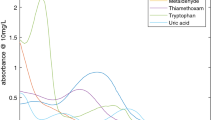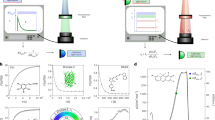Abstract
IN 1957 Szent-Györgyi described a procedure for the enhancement of fluorescence of compounds spotted on paper by cooling with solid carbon dioxide or liquid nitrogen1. Gordon and South have applied this procedure to the action of aromatic acids and other aromatic ring-containing compounds2. We have found that by observing absorption, fluorescence and delayed fluorescence on exposure to long and short wave-length ultra-violet light, NAD+ and NADH can be distinguished from each other and from ADP and ATP.
This is a preview of subscription content, access via your institution
Access options
Subscribe to this journal
Receive 51 print issues and online access
$199.00 per year
only $3.90 per issue
Buy this article
- Purchase on Springer Link
- Instant access to full article PDF
Prices may be subject to local taxes which are calculated during checkout
Similar content being viewed by others
References
Szent-Györgyi, A., Science, 126, 751 (1957).
Gordon, M. P., and South, D., J. Chromatog., 10, 513 (1963).
Randerath, K., Nature, 194, 786 (1962).
Author information
Authors and Affiliations
Rights and permissions
About this article
Cite this article
ELLIOTT, W., KLINGMAN, J. Increased Sensitivity in the Detection of Adenine and Pyridine Nucleotides by Exposure to Ultraviolet Light at Low Temperature. Nature 206, 1044–1045 (1965). https://doi.org/10.1038/2061044b0
Issue Date:
DOI: https://doi.org/10.1038/2061044b0
Comments
By submitting a comment you agree to abide by our Terms and Community Guidelines. If you find something abusive or that does not comply with our terms or guidelines please flag it as inappropriate.



